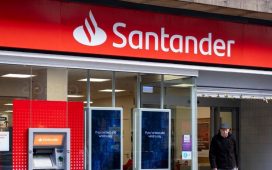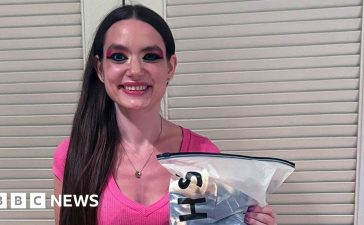Mark Cuban didn’t want to invest in Genius Litter — until a bidding war between his “Shark Tank” co-stars annoyed him into changing his mind.
The Austin, Texas-based company sells color-changing cat litter can alert pet owners of potential illnesses. Founded in 2020, Genius Litter is already profitable, CEO and founder Ramon van Meer said on Friday’s episode of the ABC show — with $3.1 million in year-to-date sales and $456,000 in year-to-date profits at the time of filming.
“It tests the urine. If it’s a high pH or a low pH, it will tell you if there’s a potential health issue,” said van Meer. “For example, if it turns red, it could be a kidney problem. If it’s blue or green, it could be a UTI.”
Van Meer had an entrepreneurial track record: In 2018, the Dutchman sold his first company, a soap opera blog, for $9 million, he said. That allowed him to put $1 million of his own cash, plus another $1 million already raised from other investors, into launching Genius Litter.
He wanted the show’s investor judges to help him do the same with his new company, he said, and asked them for $250,000 in exchange for 4% of Genius Litter.
“I want to build and scale this business and then sell it [strategically],” said van Meer. “We have two new products coming out [including] a health-indicating topper [that you can sprinkle] on top of your existing cat litter … and a health-indicating doggy pee pad.”
“Great idea,” investor Robert Hervajec said. “You’re really such an impressive man,” guest investor Emma Grede added. “You’re wonderful.”
The bidding war begins
Genius Litter isn’t the only pH-detecting cat litter on the market — van Meer touted his product as having “smaller particles, better odor control and less dust” than its competitors — but that didn’t stop Herjavec, Lori Greiner and Kevin O’Leary from immediately making offers.
“Lori and I have been talking about this … Here’s the deal, we want 10% of the company for $250,000, but we want a $2 royalty until we get back $1 million,” O’Leary said.
Van Meer wasn’t interested. “I don’t think [royalty deals] are in the best interest for the company. If you believe in me, why not just equity?” he asked.
Cuban and Herjavec applauded him for pushing back, prompting O’Leary and Greiner to make another offer: $250,000 for 20%. Herjavec made an offer of his own: $250,000 for 10%.
“How about three Sharks?” van Meer asked, countering with 10% split evenly among the three investors.
The Cuban scoop
At first, Cuban and Grede each declined to make an offer, citing their lack of industry experience and interest in cat litter. But as the other investors argued with van Meer about advisor shares and equity, Cuban expressed frustration with the back-and-forth.
“Ramon, you came in asking for 4% … I’m so tired of this, I’ll do $250,000 for 8%. But you’ve got to say yes right now,” he said.
“He should not be able to come in and scoop it,” Greiner rebutted.
Cuban has long used silence and the element of surprise as his go-to negotiation tactic, he said last year on Fireside, an interactive streaming app he co-founded.
“[Silence] gives you a chance to learn. There will be times when someone walks in on ‘Shark Tank’ and I’m thinking to myself: ‘There’s no way I’m interested. Or, if I am, I don’t have quite all the data that I need to make a decision,'” he said. “When I listen to the other Sharks, they’re going to tell me if I have any competition financially to do a deal. They’re going to teach me things, potentially, about that industry … about the person.”
Unwilling to go down without a fight, Greiner proposed another joint offer with O’Leary and Herjavec: $250,000 for an 8% equity stake plus 2% in advisory shares.
But O’Leary wanted no part of it. “Ramon, I love you but I’m going to pass. It’s just not enough,” he said, making room for Cuban to take his place.
Ultimately, van Meer chose to accept the offer from the trio of Greiner, Herjavec and Cuban — even though it meant giving up the additional 2% in advisory shares.
“They all have different types of expertise and networks, and I think it’s going to be great,” said van Meer. “I can’t wait to work with them.”
Disclosure: CNBC owns the exclusive off-network cable rights to “Shark Tank,” which features Mark Cuban as a panelist.
Want to land your dream job in 2024? Take CNBC’s new online course How to Ace Your Job Interview to learn what hiring managers are really looking for, body language techniques, what to say and not to say, and the best way to talk about pay. Get started today and save 50% with discount code EARLYBIRD.












